Exploring Blue Light In The Context Of Home Theaters
Exploring Blue Light In The Context Of Home Theaters
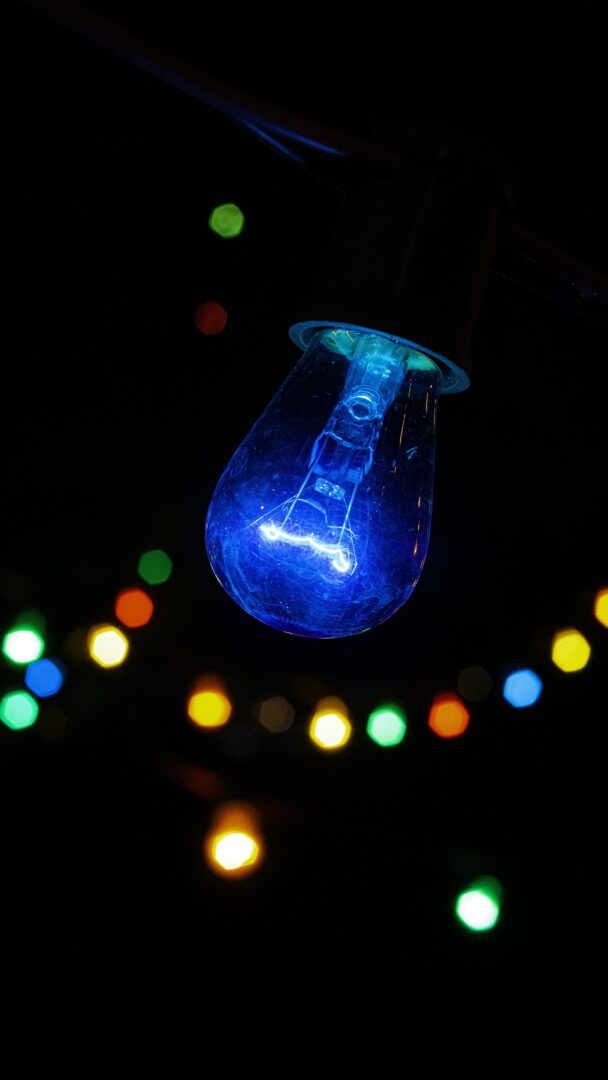
Hey how is everyone today?
Today we’re going to be covering an extremely important subject; so important in fact that it just may change how you look at the world (quite literally!)
We’re going to cover a pretty interesting topic; blue light in the context of home theaters.
Whether you’ve heard of it or not, blue light is something that’s subtle yet constant in our every day environment.
I do want to preface this though by stating that by no means is any of this meant to be taken as medical advice since I’m not a medical professional of any kind.
This article is based on references to external research.
And it’s research that can change since our understanding of things can change.
I also give my opinion on said research along with personal anecdotes from a home theater perspective.
But with with that being said it’s going to be an interesting one so let’s get right into it.
What Exactly Is Blue Light?
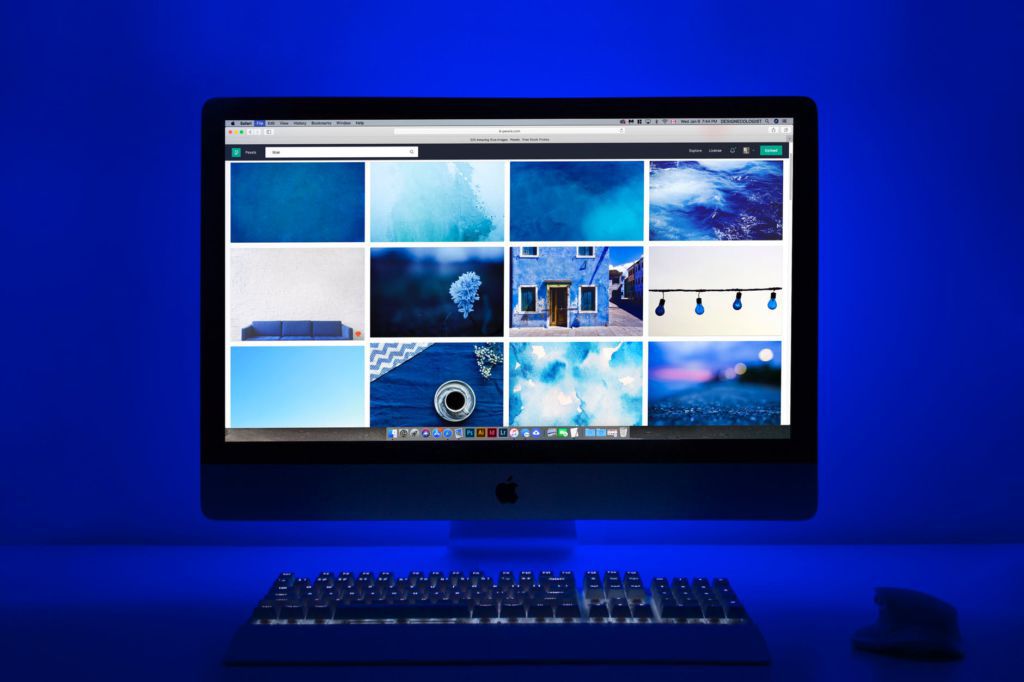
So what exactly is blue light?
The answer to that question is tied with how we perceive the visible light spectrum.
All of this spectrum, often referred to as the electromagnetic spectrum, is measured in what are known as nanometers (abbreviated nm), and goes from 380 nanometers (on the blue side) to 700 nanometers (on the red side)
So to make it simple, blue light is the visible light ranging from 380 to about 500 nm.
You’ll also often see this referred to as HEV, or high energy visible light, and makes up about a third of what you see. Sometimes you’ll see it broken down even further into blue violet and blue turquoise light, but it still falls under the same umbrella.
Now the weird thing about the light spectrum is that the closer you get to the red side of things, the longer the wavelength of the light ray and the less energy it has.
Where as the closer you get to the blue side, the shorter the wavelength and the more energy it has.
Does that remind you of anything?
Sound waves!
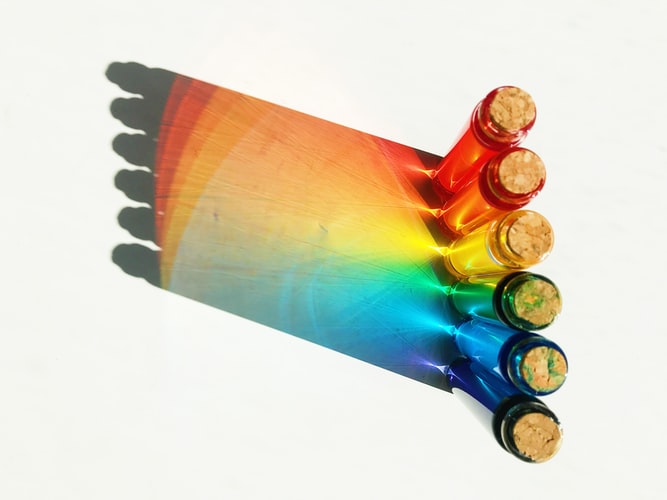
Just like with sound waves, the longer the wavelength, the less energy it’s going to end up having. But as it gets shorter, that energy is concentrated, and that concentration of energy corresponds with a change in the color.
So by the time you’re on the blue end of the spectrum, those waves are already carrying a lot of energy. These are sometimes called blue-violet or even violet light.
However light doesn’t stop there and continues on in both directions.
But this is beyond what the human eye can perceive.
When you extend past the visible red light rays, you get electromagnetic waves often referred to as infrared. These waves give off heat but are invisible to the naked eye.
An example of this would be a heating lamp. You can’t see the heat given off obviously, but you can feel it. What you can see is the red light emitted. The heat doesn’t actually come from the red light though, but rather from the invisible infrared light.
On the opposite end, once you travel past blue and violet light, you’re going into the invisible radiation territory. These waves should seem more familiar as these are what’s known as Ultraviolet (UV) rays.
These have the most energy.
Where Does Blue Light Come From?
Now where exactly is it all coming from you ask?
Well, everywhere!
Computer screens, cell phones, LED lights, etc. are all sources of blue light. The biggest source by far though is our very own sun.
Pretty interesting right? But think about it.
If you’ve ever been outside for a few hours on a really hot day, and you didn’t pack sunscreen, chances are you’d run the risk of sunburn. This is actually from the excess of UV that you’d be exposed to; and as we mentioned earlier, Ultraviolet radiation falls under the blue side of light.
So since the sun is literally a giant ball of energy, it only makes sense that it would be the biggest progenitor of that kind of light. That being said, with our recent advances in technology, it’s quickly taking a backseat.
Due to the rise of appliances and devices like televisions and smartphones, people are not only starting to spend more time in doors than out, but also more time in front of these screens.
Are There Benefits To Blue Light?
Again this isn’t medical advice so by no means should it be taken as such. It’s simply my view on things.
But with that said, there are some speculated benefits to blue light that do make it important from what I’ve noticed.
There’s even research is suggesting that special UV LEDs may help with vitamin D production.
Other studies have found potential benefits like increased mental clarity, improved cognitive function and better memory.
https://brighamhealthhub.org/blue-light-boosts-alertness-study-shows/.
As you probably gleaned, getting enough blue light seems important for proper function.
But what happens when you get too much?
Well there’s differing views on that actually.
Is Blue Light Bad For You?
So the answer is tough since the research is always evolving.
A lot can happen according to it, key word being can, since it’ll obviously depend on any number of external factors like age, health status, etc.
When dealing with overexposure to this kind of light, one of the more common things seems to be eye strain.
Eye strain can be in the form of fatigue, burning, watering, redness, you get the idea.
But because of the fact that blue light has such a high energy, it’s diffuse, meaning it’s kind of all over the place. You’ll commonly see this problem exacerbated with digital screens which show multiple images per second to produce motion.
This stresses the eye out since the human eye can’t focus on a single image, and it isn’t great at blocking this type of light out to begin with.
So when you’re looking at a screen for any long period of time, there’s the claim of the potential of visual fatigue.
This is why 100 percent UV blocking sun glasses can be effective when you’re outside since they block the UV light trying to get through to the eye.
It’s also why when watching a movie in a dark room, it’s recommended to have at least some sort of ambient lighting nearby to minimize this.
Another thing that can happen is it seems too much could disrupt your sleeping pattern.
https://www.sleepfoundation.org/bedroom-environment/blue-light
Over exposure to light at night may suppress melatonin levels, which is the hormone responsible for proper circadian rhythms (your internal clock) This lack of the important hormone can lead to bad sleep quality.
That’s why it’s recommended to get proper light exposure in the day time because it helps you to be more alert.
At night, that’s not necessary, and you should want to minimize it as much as possible.
But again, with our society so deeply ingrained with technology now, that’s become much harder to do, and is much easier said than done.
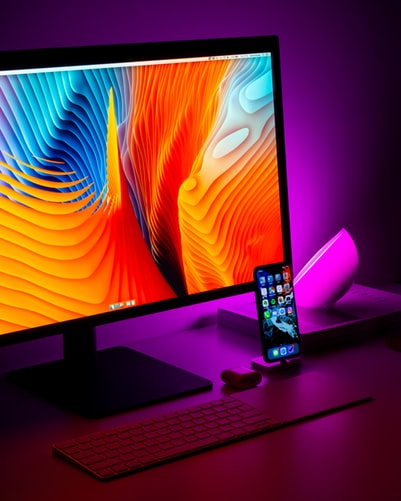
Moving on to the more serious side of things, one condition that I’ve noticed stated that overexposure to blue light can cause is macular degeneration. This is a deterioration of the eye, and can lead to decreased eyesight and even blindness.
There have been studies that link excess blue light with misaligned circadian rhythms and other conditions.
https://www.ncbi.nlm.nih.gov/pmc/articles/PMC5473809/
So yeah, it definitely seems like blue light is a multi layered topic.
From what I’ve noticed, it seems like the research is not definitive since it’s such a new topic so it doesn’t seem like things are particularly is set in stone.
There’s a lot of differing views on on what its exact effects are on the human body.
https://www.aao.org/eye-health/tips-prevention/should-you-be-worried-about-blue-light
Still, even what evidence we have now is enough at least be aware of what it is since the impacts of it seem to vary a bit.
Is It Possible To Tell If There’s Too Much Blue Light?
Is it possible to tell if you’ve been getting too much blue light exposure?
Well headaches, burning eyes, lack of focus, and even trouble sleeping could potentially be signs according to some from what I read.
https://www.healthline.com/health/blue-light-headaches
If you notice that lately you’ve just been feeling fatigued and like you can’t sleep, it could be blue light according to the research.
https://pmc.ncbi.nlm.nih.gov/articles/PMC9424753/
Think about what your current night time habits are too.
If you find yourself checking Instagram or watching Netflix right before bed, it might be over stimulating your brain and preventing you from getting the restorative sleep your body needs. The combination of light and moving images might do the exact opposite by keeping you awake.
Then there’s the flipside where there’s the question if you can minimize your exposure.
How Can You Reduce Exposure To It?
There seems to be things you can do to reduce your exposure to it according to research.
https://academic.oup.com/sleepadvances/article/1/1/zpaa002/5851240
One really cool technique that I like to use when looking at a screen for a long time is the 20 20 20 rule.
This rule basically states that for every 20 minutes you’re looking at a digital image on screen, look away for 20 seconds at something 20 feet away. This can help minimize eyestrain since it acts as a soft reset for your eyes.
I like to use this when I’m watching shows or even gaming on my home theater.
Another thing that could help is changing your nighttime habits.
Since prior mentioned research proposed that excess light at night could affect melatonin levels which then affects your quality of sleep, one thing you can do is limit all electronics 1 to 2 hours before you go to bed. This might help with feeling more relaxed and falling asleep.
So if you’re having movie night with your home theater setup, having it earlier in the evening may be worth considering.
One of my favorite ways to limit my exposure to blue light is using what are called blue light blocking eyeglasses. These glasses have specially made lenses that like the name would suggest, are designed to filter out a large portion of blue light.
Even certain smartphones nowadays have built in blue light filters that help as well. Check to see if yours does too.
They have a number of potential uses including reducing eyestrain when staring at a computer or phone screen for long periods of time, and protecting your eyes from UV light when you’re outside though their efficacy depends.
There’s a bunch of good ones out there in my opinion but I’ve found these to be pretty good in the regard.
Blue Light Blocking Glasses
Of course you also have the simple option of just taking a break every once in a while if you do find yourself looking at a screen for hours.
Getting up to stretch every once in a while for few minutes might help with feeling better.
Anything Else I Should Know?
Well we’ve went over a lot here today but just to recap, blue light is just about everywhere, with the biggest source being our sun. However since we’ve now become so accustomed to our devices, this is rapidly changing.
Did you know that over 80 percent of adults reported to using a device for more than 2 hours a day?
That’s a pretty huge number, which is probably likely to increase in the coming years.
So according to that, a large portion may be impacted by blue light in some way shape or form; making it an extremely important subject.
And chances are, a majority of those impacted probably haven’t even heard of it before. Or they have, but haven’t really given it much thought.
The bottom line is this; given its potentially hazardous nature when in surplus according to some research, it’s at least something you should be aware of. The research might be contentious right now, but it’s still something worth keeping in mind.
From what I’ve personally experienced, I could understand why, especially when I’m looking at a screen for too long.
But the problem is blue light is also something that’s beneficial to us too according to research; which is why it’s not such a clear cut subject.
What you should takeaway from this article is that while we may not know all the details behind blue light, there are things that could help.
Find yourself in front of a computer screen hours on end watching shows or gaming?
Sit an arms length away and lower the brightness.
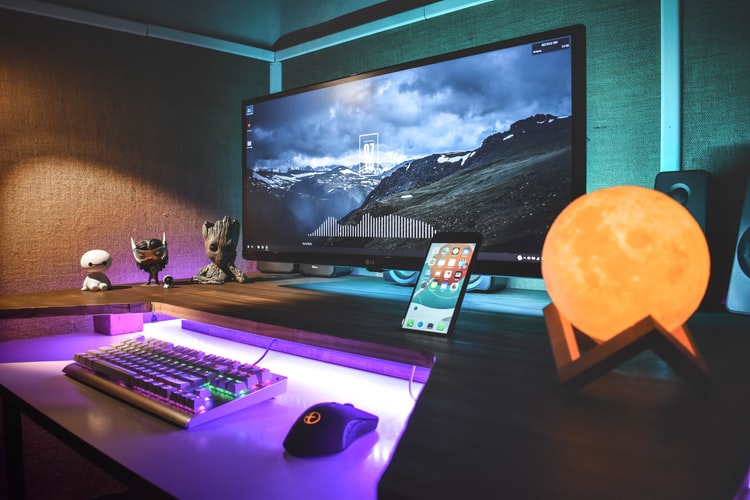
Watching a lot of movies on your new TV & surround setup?
Try reducing the glare by minimizing lights around and overhead.
Even doing things like increasing text size might help with eye strain, and turning electronics off an hour before bed could help with sleep.
Light blocking glasses like I mentioned earlier might help too.
I mean a topic like this is especially important in a hobby like home theater where we have so much fun with our toys and in front of our screens, that we don’t actually stop to realize how much time we spend doing so (me included)
But with that folks, I feel like that about wraps things up for now.
Until next time, make it easy, keep it simple!
About Me

Jay
Hey everyone it’s nice to meet you. I'm Jay, writer & founder of the site Easy Home Theater. I've been with this hobby of home entertainment for many years now. I decided to create this site to be a helpful resource, and share everything that I've learned from personal experience with you. I also happen to be a huge gamer, lover of all things tech related, and a major fitness buff (love weightlifting)
Contact: Contact Jay
Facebook: https://www.facebook.com/Easyhometheater/
X: https://x.com/easyhometheater
Pinterest: https://www.pinterest.com/easyhometheater/pins/
Instagram: https://www.instagram.com/easyhometheater/
Followit: https://follow.it/easy-home-theater
Bluesky: https://bsky.app/profile/easyhometheater.bsky.social



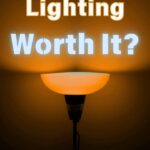

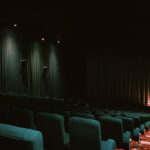

Leave a Reply